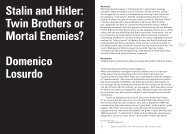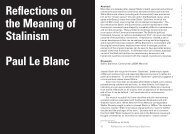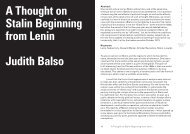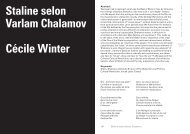adrian
adrian
adrian
- No tags were found...
You also want an ePaper? Increase the reach of your titles
YUMPU automatically turns print PDFs into web optimized ePapers that Google loves.
transzendentalen Einheit der Apperzeption). Through thecategorieswhich are these objective determinations, the manifold of givenrepresentations is so determined as to be brought into the unityof consciousness. According to this exposition, the unity of thenotion is that whereby something is not a mere mode of feeling, anintuition, or even a mere representation (bloßeGefühlsbestimmung,Anschauung oder auch bloße Vorstellung), but is an object(Objekt),and this objective unity is the unity of the ego with itself (welcheobjektive Einheit die Einheit des Ich mit sich selbst ist). In point offact, the comprehension of an object (Das Begreifen einesGegenstandes) consists in nothing else than that the ego makesit its own, pervades (durchdringt) it and brings it into its own form(seine eigene Form), that is, into the universality that is immediatelya determinateness, or a determinateness that is immediatelyuniversality. As intuited or even in ordinary conception, the objectis still something external and alien (Äußerliches, Fremdes). Whenit is comprehended, the being-in-and-for-self (Anundfürsichsein)which it possesses in intuition and pictorial thought (Vorstellen)is transformed into a positedness (Gesetztsein); the I in thinkingit pervades it. But it is only as it is in thought that the object is trulyin and for itself; in intuition or ordinary conception it is only anAppearance. Thought sublates the immediacy with which theobject at first confronts us and thus converts the object into apositedness; but this its positedness is its-being-in-and-for-self,or its objectivity (Objektivität). The object (Gegenstand) thereforehas its objectivity in the Notion (Begriffe) and this is the unity ofselfconsciousnessinto which it has been received; consequently itsobjectivity, or the Notion, is itself none other than the nature of selfconsciousness,has no other moments or determinations than the Iitself. 37CRISIS&CRITIQUE#3what the Notion is.” 38 Hegel explicitly refers in particular to B137 in the“Transcendental Deduction” (§17 therein, entitled “The principle of thesynthetic unity of apperception is the supreme principle of all use of theunderstanding”) of the Critique of Pure Reason. 39 On Pippin’s construal,the Kantian transcendental unity of apperception likewise is “thesupreme principle” of Hegel’s philosophy as itself ultimately groundedon and by the Logic—and this insofar as such a unity is taken to be theunderlying agency of cognition responsible for driving the entire activityof logical, dialectical-speculative thinking (as a “thinking about thinking”)from its very inception with pure Being alone. Both the Science ofLogic and the Encyclopedia Logic thereby look to be rectifications ofwhat Hegel sees (along with many other of Kant’s contemporaries andimmediate successors) as the unacceptable absence of a systematic,scientific (als Wissenschaft) derivation of the concepts and categoriesof the understanding from the transcendental unity of apperception inthe “Transcendental Analytic” of the first Critique (with K.L. Reinholdand J.G. Fichte kicking off post-Kantian German idealism through theiranti-Jacobian efforts to remedy this lack of sufficient systematicity/scientificity in the Kantian critical-transcendental apparatus). 40In addition to Žižek’s criticisms of the deflationary depiction ofHegelianism à la Pippin, what else might be objectionable specifically asregards Pippin’s anchoring of his reconstruction of Hegel in the abovequotedpassage from the Science of Logic praising Kant’s unity ofapperception as per the B-version of the “Transcendental Deduction?”To thoroughly answer this question would be to destabilize Pippin’sdeflationary Hegelianism at its very root, to undermine the fundamentalload-bearing pillar of this exegetical edifice. Žižek does not go forthis particular jugular in Less Than Nothing, although doing so wouldserve him well. Moreover, other dissenters from Pippin’s KantianizedHegel such as H.S. Harris, Sedgwick, and Stern, despite their differentsets of objections to Pippin, all concede that his construal of Hegel’srelationship to Kant’s “Transcendental Deduction” is one of the (ifnot the) great strengths of his approach, granting that this construalilluminates places in the Hegelian corpus such as the preceding blockCRISIS&CRITIQUE#3The first sentence of the immediately following paragraphgoes on to state, “Thus we are justified by a cardinal principle of theKantian philosophy in referring to the nature of the I in order to learn38 Hegel 1969a, p. 585.39 Kant 1998, B137 (p. 249).37 Hegel 1969c, pp. 254-255; Hegel 1969a, pp. 584-585.40 Hegel and Schelling 2002, p. 212; Hegel 1977c, pp. 142-145; Hegel 1969a, pp. 613-614; Hegel1991c, §42 (p. 84), §60 (pp. 107-108); Hegel 1955b, p. 483; Hegel 2008,§42 (p. 35); Johnston 2014b.380 “Where to Start?: Robert Pippin, Slavoj Žižek...381“Where to Start?: Robert Pippin, Slavoj Žižek...






